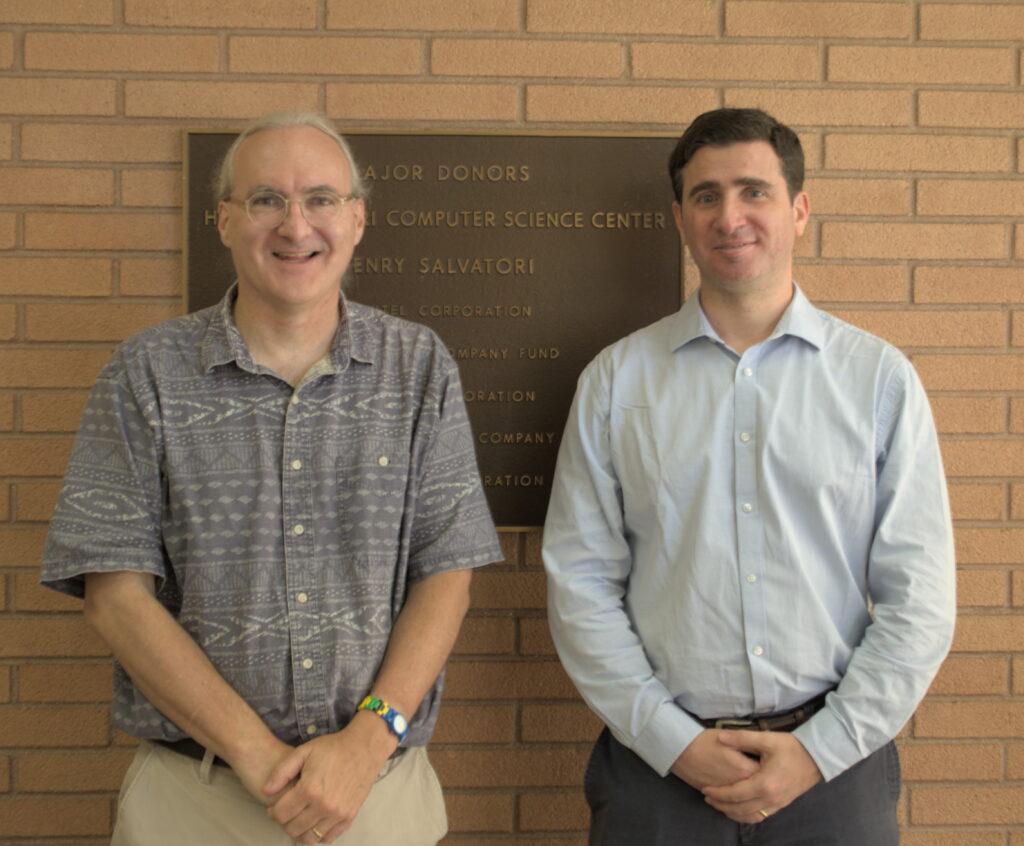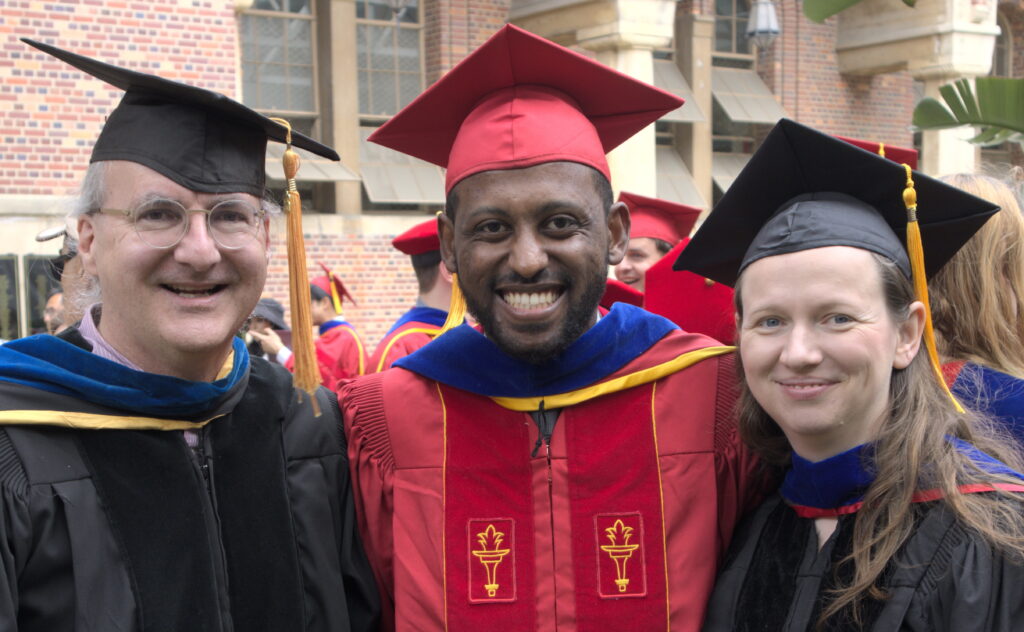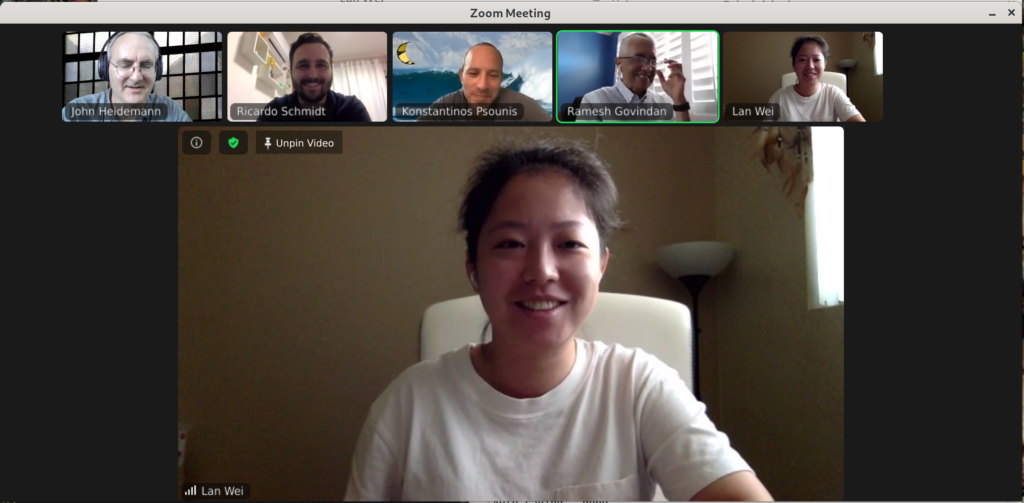Recent PhD graduate ASM Rizvi was featured in an ISI News story, sharing his thoughts about joining USC and ISI and what he plans to do after graduation.
Congratulations again, Rizvi!

Recent PhD graduate ASM Rizvi was featured in an ISI News story, sharing his thoughts about joining USC and ISI and what he plans to do after graduation.
Congratulations again, Rizvi!

I would like to congratulate Dr. ASM Rizvi for defending his PhD at the University of Southern California in June 2024 and completing his doctoral dissertation “Mitigating Attacks that Disrupt Online Services Without Changing Existing Protocols”.
From the dissertation abstract:
Service disruption is undesirable in today’s Internet connectivity due to its impacts on enterprise profits, reputation, and user satisfaction. We describe service disruption as any targeted interruptions caused by malicious parties in the regular user-to-service interactions and functionalities that affect service performance and user experience. In this thesis, we propose new methods that tackle service disruptive attacks using measurement without changing existing Internet protocols. Although our methods do not guarantee defense against all the attack types, our example defense systems prove that our methods generally work to handle diverse attacks. To validate our thesis, we demonstrate defense systems against three disruptive attack types. First, we mitigate Distributed Denial-of-Service (DDoS) attacks that target an online service. Second, we handle brute-force password attacks that target the users of a service. Third, we detect malicious routing detours to secure the path from the users to the server. We provide the first public description of DDoS defenses based on anycast and filtering for the network operators. Then, we show the first moving target defense utilizing IPv6 to defeat password attacks. We also demonstrate how regular observation of latency helps cellular users, carriers, and national agencies to find malicious routing detours. As a supplemental outcome, we show the effectiveness of measurements in finding performance issues and ways to improve using existing protocols. These examples show that our idea applies to different network parts, even if we may not mitigate all the attack types.
Rizvi’s PhD work was supported by the U.S. Department of Homeland Security’s HSARPA Cyber Security Division (HSHQDC-17-R-B0004-TTA.02-0006-I, PAADDOS) in a joint project with the Netherlands Organisation for scientific research (4019020199), the U.S. National Science Foundation (grant NSF OAC-1739034, DDIDD; CNS-2319409, PIMAWAT; CRI-8115780, CLASSNET; CNS-1925737, DIINER ) and U.S. DARPA (HR001120C0157, SABRES), and Akamai.
Most data from his papers is available at no cost from ANT; please see specific publications for details.
I would like to congratulate Dr. Guillermo Baltra for defending his PhD at the University of Southern California in August 2023 and completing his doctoral dissertation “Improving network reliability using a formal definition of the Internet core”.

From the abstract:
After 50 years, the Internet is still defined as “a collection of interconnected networks”. Yet seamless, universal connectivity is challenged in several ways. Political pressure threatens fragmentation due to de-peering; architectural changes such as carrier-grade NAT, the cloud makes connectivity indirect; firewalls impede connectivity; and operational problems and commercial disputes all challenge the idea of a single set of “interconnected networks”. We propose that a new, conceptual definition of the Internet core helps disambiguate questions in analysis of network reliability and address space usage.
We prove this statement through three studies. First, we improve coverage of outage detection by dealing with sparse sections of the Internet, increasing from a nominal 67% responsive /24 blocks coverage to 96% of the responsive Internet. Second, we provide a new definition of the Internet core, and use it to resolve partial reachability ambiguities. We show that the Internet today has peninsulas of persistent, partial connectivity, and that some outages cause islands where the Internet at the site is up, but partitioned from the main Internet. Finally, we use our definition to identify ISP trends, with applications to policy and improving outage detection accuracy. We show how these studies together thoroughly prove our thesis statement. We provide a new conceptual definition of “the Internet core” in our second study about partial reachability. We use our definition in our first and second studies to disambiguate questions about network reliability and in our third study, to ISP address space usage dynamics.
Guillermo’s PhD work was supported by NSF grants CNS-1806785, CNS-2007106 and NSF-2028279 and DH S&T Cyber Security Division contract 70RSAT18CB0000014 and a DHS contract administred by AFRL as contract FA8750-18-2-0280, to USC Viterbi, the Armada de Chile, and the Agencia Nacional de Investigación y Desarrollo de Chile (ANID).
Please see his individual publications for what data is available from his research; his results are also in use in ongoing Trinocular outage detection datasets.
I would like to congratulate Dr. Basileal Imana for defending his PhD at the University of Southern California in August 2023 and completing his doctoral dissertation “Methods for Auditing Social Media Algorithms in the Public Interest”.

From the abstract:
Social-media platforms are entering a new era of increasing scrutiny by public interest groups and regulators. One reason for the increased scrutiny is platform-induced bias in how they deliver ads for life opportunities. Certain ad domains are legally protected against discrimination, and even when not, some domains have societal interest in equitable ad delivery. Platforms use relevance-estimator algorithms to optimize the delivery of ads. Such algorithms are proprietary and therefore opaque to outside evaluation, and early evidence suggests these algorithms may be biased or discriminatory. In response to such risks, the U.S. and the E.U. have proposed policies to allow researchers to audit platforms while protecting users’ privacy and platforms’ proprietary information. Currently, no technical solution exists for implementing such audits with rigorous privacy protections and without putting significant constraints on researchers. In this work, our thesis is that relevance-estimator algorithms bias the delivery of opportunity ads, but new auditing methods can detect that bias while preserving privacy.
We support our thesis statement through three studies. In the first study, we propose a black-box method for measuring gender bias in the delivery of job ads with a novel control for differences in job qualification, as well as other confounding factors that influence ad delivery. Controlling for qualification is necessary since qualification is a legally acceptable factor to target ads with, and we must separate it from bias introduced by platforms’ algorithms. We apply our method to Meta and LinkedIn, and demonstrate that Meta’s relevance estimators result in discriminatory delivery of job ads by gender. In our second study, we design a black-box methodology that is the first to propose a means to draw out potential racial bias in the delivery of education ads. Our method employs a pair of ads that are seemingly identical education opportunities but one is of inferior quality tied with a historical societal disparity that ad delivery algorithms may propagate. We apply our method to Meta and demonstrate their relevance estimators racially bias the delivery of education ads. In addition, we observe that the lack of access to demographic attributes is a growing challenge for auditing bias in ad delivery. Motivated by this challenge, we make progress towards enabling use of inferred race in black-box audits by analyzing how inference error can lead to incorrect measurement of skew in ad delivery. Going beyond the domain-specific and black-box methods we used in our first two studies, our final study proposes a novel platform-supported framework to allow researchers to audit relevance estimators that is generalizable to studying various categories of ads, demographic attributes and target platforms. The framework allows auditors to get privileged query-access to platforms’ relevance estimators to audit for bias in the algorithms while preserving the privacy interests of users and platforms. Overall, our first two studies show relevance-estimator algorithms bias the delivery of job and education ads, and thus motivate making these algorithms the target of platform-supported auditing in our third study. Our work demonstrates a platform-supported means to audit these algorithms is the key to increasing public oversight over ad platforms while rigorously protecting privacy.
Basi’s PhD work was co-advised by Aleksandra Korolova and John Heidemann, and supported by grants from the Rose Foundation and the NSF (CNS-1755992, CNS-1916153, CNS-1943584, CNS-1956435, and CNS-1925737.) Please see his individual publications for what data is available from his research.
I would like to congratulate Dr. Abdul Qadeer for defending his PhD at the University of Southern California in March 2021 and completing his doctoral dissertation “Efficient Processing of Streaming Data in Multi-User and Multi-Abstraction Workflows”.
From the abstract:

Ever-increasing data and evolving processing needs force enterprises to scale-out expensive computational resources to prioritize processing for timely results. Teams process their organization’s data either independently or using ad hoc sharing mechanisms. Often different users start with the same data and the same initial stages (decrypt, decompress, clean, anonymize). As their workflows evolve, later stages often diverge, and different stages may work best with different abstractions. The result is workflows with some overlap, some variations, and multiple transitions where data handling changes between continuous, windowed, and per-block. The system processing this diverse, multi-user, multi-abstraction workflow should be efficient and safe, but also must cope with fault recovery.
Analytics from multiple users can cause redundant processing and data, or encounter performance anomalies due to skew. Skew arises due to static or dynamic imbalance in the workflow stages. Both redundancy and skew waste compute resources and add latency to results. When users bridge between multiple abstractions, such as from per-block processing to windowed processing, they often employ custom code. These transitions can be error prone due to corner cases, can easily add latency as an inefficiency, and custom code is often a source of errors and maintenance difficulty. We need new solutions to manage the above challenges and to expose opportunities for data sharing explicitly. Our thesis is: new methods enable efficient processing of multi-user and multi-abstraction workflows of streaming data. We present two new methods for efficient stream processing—optimizations for multi-user workflows, and multiple abstractions for application coverage and efficient bridging.
These algorithms use a pipeline-graph to detect duplication of code and data across multiple users and cleanly delineate workflow stages for skew management. The pipeline-graph is our job description language that allows developers to specify their need easily and enables our system to automatically detect duplication and manage skew. The pipeline-graph acts as a shared canvas for collaboration amongst users to extend each other’s work. To efficiently implement our deduplication and skew management algorithms, we present streaming data to processing stages as fixed-sized but large blocks. Large-blocks have low meta-data overhead per user, provide good parallelism, and help with fault recovery.
Our second method enables applications to use a different abstraction on a different workflow stage. We provide three key abstractions and show that they cover many classes of analytics and our framework can bridge them efficiently. We provide Block-Streaming, Windowed-Streaming, and Stateful-Streaming abstractions. Block-Streaming is suitable for single-pass applications that care about temporal or spatial locality. Windowed-Streaming allows applications to process accumulated data (time-aligned blocks to sync with external information) and reductions like summation, averages, or other MapReduce-style analytics. We believe our three abstractions allow many classes of analytics and enable processing of one block, many blocks, or infinite stream. Plumb allows multiple abstractions in different parts of the workflow and provides efficient bridging between them so that users could make complex analytics from individual stages without worrying about data movement.
Our methods aim for good throughput, low latency, and clean and easy-to-use support for more applications to achieve better efficiency than our prior hand-tuned but often brittle system. The Plumb framework is the implementation of our solutions and a testbed to validate them. We use real-world workloads from the B-Root DNS domain to demonstrate effectiveness of our solutions. Our processing deduplication increases throughput up to $6\times$, reduces storage by 75%, as compared to their pre-Plumb counterparts. Plumb reduces CPU wastage due to structural skew up to half and reduces latency due to computational skew by 50%. Plumb has cut per-block latency by 74% and latency of daily statistics by 97%, while reducing code size by 58% and lowering manual intervention to handle problems by 73% as compared to pre-Plumb system.
The operational use of Plumb for the B-Root service provides a multi-year validation of our design choices under many traffic conditions. Over the last three years, Plumb has processed more than 12PB of DNS packet data and daily statistics. We show that our abstractions apply to many applications in the domain of networking big-data and beyond.
I would like to congratulate Dr. Manaf Gharaibeh for defending his PhD at Colorado State University in February 2020 and completing his doctoral dissertation “Characterizing the Visible Address Space to Enable Efficient, Continuous IP Geolocation” in March 2020.
From the abstract:
Internet Protocol (IP) geolocation is vital for location-dependent applications and many network research problems. The benefits to applications include enabling content customization, proximal server selection, and management of digital rights based on the location of users, to name a few. The benefits to networking research include providing geographic context useful for several purposes, such as to study the geographic deployment of Internet resources, bind cloud data to a location, and to study censorship and monitoring, among others.
The measurement-based IP geolocation is widely considered as the state-of-the-art client-independent approach to estimate the location of an IP address. However, full measurement-based geolocation is prohibitive when applied continuously to the entire Internet to maintain up-to-date IP-to-location mappings. Furthermore, many IP address blocks rarely move, making it unnecessary to perform such full geolocation.
The thesis of this dissertation states that \emph{we can enable efficient, continuous IP geolocation by identifying clusters of co-located IP addresses and their location stability from latency observations.} In this statement, a cluster indicates a group of an arbitrary number of adjacent co-located IP addresses (a few up to a /16). Location stability indicates a measure of how often an IP block changes location. We gain efficiency by allowing IP geolocation systems to geolocate IP addresses as units, and by detecting when a geolocation update is required, optimizations not explored in prior work. We present several studies to support this thesis statement.
We first present a study to evaluate the reliability of router geolocation in popular geolocation services, complementing prior work that evaluates end-hosts geolocation in such services. The results show the limitations of these services and the need for better solutions, motivating our work to enable more accurate approaches. Second, we present a method to identify clusters of \emph{co-located} IP addresses by the similarity in their latency. Identifying such clusters allows us to geolocate them efficiently as units without compromising accuracy. Third, we present an efficient delay-based method to identify IP blocks that move over time, allowing us to recognize when geolocation updates are needed and avoid frequent geolocation of the entire Internet to maintain up-to-date geolocation. In our final study, we present a method to identify cellular blocks by their distinctive variation in latency compared to WiFi and wired blocks. Our method to identify cellular blocks allows a better interpretation of their latency estimates and to study their geographic properties without the need for proprietary data from operators or users.
I would like to congratulate Dr. Lan Wei for defending her PhD in September 2020 and completing her doctoral dissertation “Anycast Stability, Security and Latency in The Domain Name System (DNS) and Content Deliver Networks (CDNs)” in December 2020.

From the abstract:
Clients’ performance is important for both Content-Delivery Networks (CDNs) and the Domain Name System (DNS). Operators would like the service to meet expectations of their users. CDNs providing stable connections will prevent users from experiencing downloading pause from connection breaks. Users expect DNS traffic to be secure without being intercepted or injected. Both CDN and DNS operators care about a short network latency, since users can become frustrated by slow replies.
Many CDNs and DNS services (such as the DNS root) use IP anycast to bring content closer to users. Anycast-based services announce the same IP address(es) from globally distributed sites. In an anycast infrastructure, Internet routing protocols will direct users to a nearby site naturally. The path between a user and an anycast site is formed on a hop-to-hop basis—at each hop} (a network device such as a router), routing protocols like Border Gateway Protocol (BGP) makes the decision about which next hop to go to. ISPs at each hop will impose their routing policies to influence BGP’s decisions. Without globally knowing (also unable to modify) the distributed information of BGP routing table of every ISP on the path, anycast infrastructure operators are unable to predict and control in real-time which specific site a user will visit and what the routing path will look like. Also, any change in routing policy along the path may change both the path and the site visited by a user. We refer to such minimal control over routing towards an anycast service, the uncertainty of anycast routing. Using anycast spares extra traffic management to map users to sites, but can operators provide a good anycast-based service without precise control over the routing?
This routing uncertainty raises three concerns: routing can change, breaking connections; uncertainty about global routing means spoofing can go undetected, and lack of knowledge of global routing can lead to suboptimal latency. In this thesis, we show how we confirm the stability, how we confirm the security, and how we improve the latency of anycast to answer these three concerns. First, routing changes can cause users to switch sites, and therefore break a stateful connection such as a TCP connection immediately. We study routing stability and demonstrate that connections in anycast infrastructure are rarely broken by routing instability. Of all vantage points (VPs), fewer than 0.15% VP’s TCP connections frequently break due to timeout in 5s during all 17 hours we observed. We only observe such frequent TCP connection break in 1 service out of all 12 anycast services studied. A second problem is DNS spoofing, where a third-party can intercept the DNS query and return a false answer. We examine DNS spoofing to study two aspects of security–integrity and privacy, and we design an algorithm to detect spoofing and distinguish different mechanisms to spoof anycast-based DNS. We show that DNS spoofing is uncommon, happening to only 1.7% of all VPs, although increasing over the years. Among all three ways to spoof DNS–injections, proxies, and third-party anycast site (prefix hijack), we show that third-party anycast site is the least popular one. Last, diagnosing poor latency and improving the latency can be difficult for CDNs. We develop a new approach, BAUP (bidirectional anycast unicast probing), which detects inefficient routing with better routing replacement provided. We use BAUP to study anycast latency. By applying BAUP and changing peering policies, a commercial CDN is able to significantly reduce latency, cutting median latency in half from 40ms to 16ms for regional users.
Lan defended her PhD when USC was on work-from-home due to COVID-19; she is the third ANT student with a fully on-line PhD defense.
I would like to congratulate Dr. Calvin Ardi for defending his PhD in April 2020 and completing his doctoral dissertation “Improving Network Security through Collaborative Sharing” in June 2020.
From the abstract:

As our world continues to become more interconnected through the
Internet, cybersecurity incidents are correspondingly increasing in
number, severity, and complexity. The consequences of these attacks
include data loss, financial damages, and are steadily moving from the
digital to the physical world, impacting everything from public
infrastructure to our own homes. The existing mechanisms in
responding to cybersecurity incidents have three problems: they
promote a security monoculture, are too centralized, and are too slow.
In this thesis, we show that improving one’s network security strongly
benefits from a combination of personalized, local detection, coupled
with the controlled exchange of previously-private network information
with collaborators. We address the problem of a security monoculture
with personalized detection, introducing diversity by tailoring to the
individual’s browsing behavior, for example. We approach the problem
of too much centralization by localizing detection, emphasizing
detection techniques that can be used on the client device or local
network without reliance on external services. We counter slow
mechanisms by coupling controlled sharing of information with
collaborators to reactive techniques, enabling a more efficient
response to security events.
We prove that we can improve network security by demonstrating our
thesis with four studies and their respective research contributions
in malicious activity detection and cybersecurity data sharing. In
our first study, we develop Content Reuse Detection, an approach to
locally discover and detect duplication in large corpora and apply our
approach to improve network security by detecting “bad
neighborhoods” of suspicious activity on the web. Our second study
is AuntieTuna, an anti-phishing browser tool that implements personalized,
local detection of phish with user-personalization and improves
network security by reducing successful web phishing attacks. In our
third study, we develop Retro-Future, a framework for controlled information
exchange that enables organizations to control the risk-benefit
trade-off when sharing their previously-private data. Organizations
use Retro-Future to share data within and across collaborating organizations,
and improve their network security by using the shared data to
increase detection’s effectiveness in finding malicious activity.
Finally, we present AuntieTuna2.0 in our fourth study, extending the proactive
detection of phishing sites in AuntieTuna with data sharing between friends.
Users exchange previously-private information with collaborators to
collectively build a defense, improving their network security and
group’s collective immunity against phishing attacks.
Calvin defended his PhD when USC was on work-from-home due to COVID-19; he is the second ANT student with a fully on-line PhD defense.
I would like to congratulate Dr. Hang Guo for defending his PhD in April 2020 and completing his doctoral dissertation “Detecting and Characterizing Network Devices Using
Signatures of Traffic About End-Points” in May 2020.

From the abstract:
The Internet has become an inseparable part of our society. Since the Internet is essentially a distributed system of billions of inter-connected, networked devices, learning about these devices is essential for better understanding, managing and securing the Internet. To study these network devices, without direct control over them or direct contact with their users, requires traffic-based methods for detecting devices. To identify target devices from traffic measurements, detection of network devices relies on signatures of traffic, mapping from certain characteristics of traffic to target devices. This dissertation focuses on device detection that use signatures of traffic about end-points: mapping from characteristics of traffic end-point, such as counts and identities, to target devices. The thesis of this dissertation is that new signatures of traffic about end-points enable detection and characterizations of new class of network devices. We support this thesis statement through three specific studies, each detecting and characterizing a new class of network devices with a new signature of traffic about end-points. In our first study, we present detection and characterization of network devices that rate limit ICMP traffic based on how they change the responsiveness of traffic end-points to active probings. In our second study, we demonstrate mapping identities of traffic end-points to a new class of network devices: Internet-of-Thing (IoT) devices. In our third study, we explore detecting compromised IoT devices by identifying IoT devices talking to suspicious end-points. Detection of these compromised IoT devices enables us to mitigate DDoS traffic between them and suspicious end-points.
Hang defend his PhD when USC was on work-from-home due to COVID-19, so he is the first ANT student with a fully on-line PhD defense.
I would like to congratulate Dr. Liang Zhu for defending his PhD in August 2018 and completing his doctoral dissertation “Balancing Security and Performance of Network Request-Response Protocols” in September 2018.

From the abstract:
The Internet has become a popular tool to acquire information and knowledge. Usually information retrieval on the Internet depends on request-response protocols, where clients and servers exchange data. Despite of their wide use, request-response protocols bring challenges for security and privacy. For example, source-address spoofing enables denial-of-service (DoS) attacks, and eavesdropping of unencrypted data leaks sensitive information in request-response protocols. There is often a trade-off between security and performance in request-response protocols. More advanced protocols, such as Transport Layer Security (TLS), are proposed to solve these problems of source spoofing and eavesdropping. However, developers often avoid adopting those advanced protocols, due to performance costs such as client latency and server memory requirement. We need to understand the trade-off between security and performance for request-response protocols and find a reasonable balance, instead of blindly prioritizing one of them.
This thesis of this dissertation states that it is possible to improve security of network request-response protocols without compromising performance, by protocol and deployment optimizations, that are demonstrated through measurements of protocol developments and deployments. We support the thesis statement through three specific studies, each of which uses measurements and experiments to evaluate the development and optimization of a request-response protocol. We show that security benefits can be achieved with modest performance costs. In the first study, we measure the latency of OCSP in TLS connections. We show that OCSP has low latency due to its wide use of CDN and caching, while identifying certificate revocation to secure TLS. In the second study, we propose to use TCP and TLS for DNS to solve a range of fundamental problems in DNS security and privacy. We show that DNS over TCP and TLS can achieve favorable performance with selective optimization. In the third study, we build a configurable, general-purpose DNS trace replay system that emulates global DNS hierarchy in a testbed and enables DNS experiments at scale efficiently. We use this system to further prove the reasonable performance of DNS over TCP and TLS at scale in the real world.In addition to supporting our thesis, our studies have their own research contributions. Specifically, In the first work, we conducted new measurements of OCSP by examining network traffic of OCSP and showed a significant improvement of OCSP latency: a median latency of only 20ms, much less than the 291ms observed in prior work. We showed that CDN serves 94% of the OCSP traffic and OCSP use is ubiquitous. In the second work, we selected necessary protocol and implementation optimizations for DNS over TCP/TLS, and suggested how to run a production TCP/TLS DNS server [RFC7858]. We suggested appropriate connection timeouts for DNS operations: 20s at authoritative servers and 60s elsewhere. We showed that the cost of DNS over TCP/TLS can be modest. Our trace analysis showed that connection reuse can be frequent (60%-95% for stub and recursive resolvers). We showed that server memory is manageable (additional 3.6GB for a recursive server), and latency of connection-oriented DNS is acceptable (9%-22% slower than UDP). In the third work, we showed how to build a DNS experimentation framework that can scale to emulate a large DNS hierarchy and replay large traces. We used this experimentation framework to explore how traffic volume changes (increasing by 31%) when all DNS queries employ DNSSEC. Our DNS experimentation framework can benefit other studies on DNS performance evaluations.